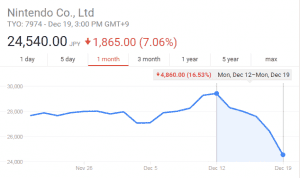Super Mario Run next big mobile hit but Nintendo shares plunge
Nintendo has continued its play on consumer nostalgia with the apparently successful launch of Super Mario Run in 151 countries worldwide, but investors seem far from impressed.
December 19, 2016

Nintendo has continued its play on consumer nostalgia with the apparently successful launch of Super Mario Run in 151 countries worldwide, but investors seem far from impressed.
Nintendo should be happy with the launch itself, as the hype delivered on numerous positive metrics. According to App Annie, prior to the launch there were 20 million pre-registrations, the game has achieved number one ranking (for downloads) in 142 countries, with an estimated $4 million in consumer spend worldwide on December 15 alone, and total downloads exceeding 37 million over the weekend.
In the UK, Super Mario Run accounted for 5% of total app downloads, almost reaching 2 million, however the US was the top downloader, totalling just over 11 million. On the final day of the weekend (December 18) it was the highest grossing game in 44 countries, including lucrative markets such as the US, UK and Germany.
While there may be a number of commentators who will liken Super Mario Run to the sweeping success that was Pokémon Go, aside from the concept of nostalgia and the Nintendo link, there are few other similarities.
The immediate success of Super Mario Run will be judged from its upfront revenue, which was not a feature of the Pokémon Go phenomenon. $4 million in revenue on the first day of release and a current number one grossing ranking in 44 markets (latest data available) is certainly nothing to complain about, however it is a much shorter-term gain than the Pokémon Go model.
Both have a focus on micro-transactions to some extent, however there are very-much different approaches. Super Mario Run relies on the traditional freemium app model, where initial gameplay is free and more advanced levels are paid for, whereas the majority of Pokémon Go gameplay is free. At least Super Mario Run isn’t making any spurious augmented reality claims.
The $4 million cash collection of day one could also be a misleading figure. The only way to gain access to advanced levels is to purchase them all at once. Yes, it does ensure purchasing from start to finish of the game, though revenues from individual users will not be sustained for long-periods of time. Unless there are some very compelling micro-transactions as the user continues to play the game, revenues are likely to tail off on a sharper curve than most games would expect.
Whether the initial surge in revenues is enough to compensate for this is only known by the Nintendo management team, though it will be interesting to see which revenue model is deemed more of a success.
Another quite significant different is the means of generating revenues. In the Super Mario Run example, revenues are seemingly limited to within the app itself, whereas the fact Pokémon Go is a game designed on mapping technology creates more opportunities outside the game. McDonald’s is a company which took advantage of the location aspect of Pokémon Go, sponsoring the game so it could host gyms in various restaurants, which in turn attracting gamers to its locations.
 While many app developers would certainly be keen to bring in $4 million revenues on the launch day of a new game, it would appear shareholders do not have the same levels of enthusiasm. The launch of Pokémon Go saw a worldwide nostalgia orgasm, which encouraged Nintendo shares to jump 15%, however the Super Mario Run performance has had the opposite effect. Comparing today (December 19) to the previous Monday (December 12) has seen a 16% decline in Nintendo share price (at the time of writing).
While many app developers would certainly be keen to bring in $4 million revenues on the launch day of a new game, it would appear shareholders do not have the same levels of enthusiasm. The launch of Pokémon Go saw a worldwide nostalgia orgasm, which encouraged Nintendo shares to jump 15%, however the Super Mario Run performance has had the opposite effect. Comparing today (December 19) to the previous Monday (December 12) has seen a 16% decline in Nintendo share price (at the time of writing).
The decline in share price does seem to mostly linked to the performance of the game as opposed to other factors in the wider business. This is the first time Nintendo has taken the entire risk of launching a mobile-game, Niantec Labs in fact owns the Pokémon franchise and the majority of the risk associated with the launch, as well as the majority of the revenues achieved through the success. The drop in share price could be down to a number of factors including negative reviews of the game from users, a tepid reception from analysts on the revenue model, or even confidence in the company’s overarching ability to compete in the mobile gaming segment.
The real success will be how sustainable the revenues are in the long-run. The initial hit of downloads and revenues will be linked more to old-school fans of the Super Mario franchise, though how the hype translates through to the mainstream market remains to be seen.
What is encouraging for the Nintendo team is the fact the game is only available on iOS for the moment. Estimates have Android as the clear market share leader in the operating system segment, accounting for roughly 87% worldwide, offering some significant potential for the game. And we haven’t even discussed the potential for a launch in China yet…
About the Author
You May Also Like












_1.jpg?width=300&auto=webp&quality=80&disable=upscale)
